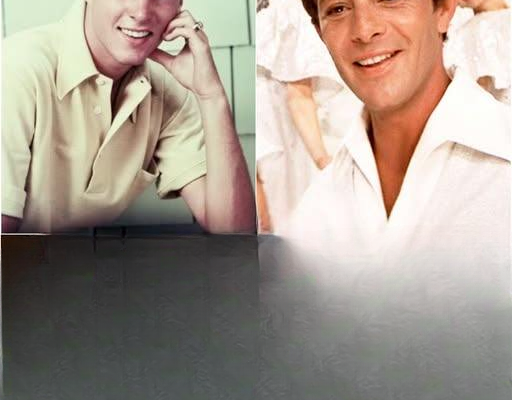In the quiet of his Los Angeles home, Frankie Avalon leans back in his chair, surrounded by golden reminders of a career that once electrified the world. The walls are lined with framed photographs—snapshots of performances, movie stills, and candid images of laughter shared with fellow entertainers. The shelves carry glistening records that mark milestones in American music history. At 84 years old, Avalon remains a symbol of an unforgettable generation. His charm hasn’t faded; it has only deepened with age, tempered by wisdom and softened with reflection.
Avalon, once a teen idol who captured the hearts of millions, now carries himself with the ease of someone who has lived through countless seasons of change. His words flow not with the rehearsed polish of a performer but with the honesty of a man unafraid to look back. At this stage in his journey, he chooses to share stories that shaped him—not only of music and movies but of the rare friendship that helped him understand what it meant to live under the glow, and sometimes the shadow, of fame.

This is the story of Frankie Avalon and Ricky Nelson. Two young men who entered the spotlight at the same time, walked through the chaos of celebrity culture together, and discovered that beyond all the glamour, what truly endures is authenticity, resilience, and trust.
Growing Up in the Spotlight
Born in South Philadelphia in 1940, Frankie Avalon, originally named Francis Thomas Avalone, showed musical promise early. He wasn’t simply another boy hoping for fame; he was a prodigy with a trumpet. By his early teens, while others were still memorizing multiplication tables, Avalon was already performing in local clubs.
At first, it seemed his destiny would be tied to orchestras and big bands. But the combination of a smooth voice, youthful charm, and good looks caught the attention of producers. With songs like “Venus” and “Why”, Avalon became one of the most recognizable faces in 1950s American pop culture.
Parents trusted him, teenagers adored him, and the entertainment industry embraced him. In an era when the rebellious energy of Elvis Presley unsettled traditional families, Avalon represented something different: safety, optimism, and a wholesome version of youthful energy.
From magazine covers to variety shows, to lighthearted beach comedies, Avalon became not just a performer but a cultural symbol. Yet behind the camera-ready smile, he was aware of the weight of expectation. “It wasn’t just about singing or acting,” he once explained. “It was about being the person the world wanted to see. Every smile, every note, every handshake carried responsibility.”
At the very same time, across the country, another boy born in the same year was also becoming a fixture in American households: Ricky Nelson.
Ricky Nelson: From Sitcom Son to Music Star
Ricky Nelson’s path to fame began in a living room America felt it already knew. The son of Ozzie and Harriet Nelson, Ricky appeared on the family’s television series, The Adventures of Ozzie and Harriet. Week after week, millions of viewers literally watched him grow up.
But Ricky wasn’t content with being only a sitcom figure. By 1957, he stepped into music with “A Teenager’s Romance” and “I’m Walkin’.” His soft delivery, paired with undeniable talent, quickly catapulted him to the top of the charts. Songs like “Poor Little Fool”, “Hello Mary Lou”, and “Travelin’ Man” became timeless classics.
By the late 1950s, Nelson wasn’t just another teen heartthrob—he was a serious competitor, holding his own against the likes of Elvis Presley. Yet unlike Presley’s swagger or Avalon’s polished charm, Nelson carried a quieter, introspective presence.
According to Avalon, Ricky never embraced the “teen idol” label fully. “He wanted people to see him as more than a television star or a teen sensation,” Avalon recalls. “He wanted to be known as a serious artist, someone who could evolve with the times.”
Crossing Paths in a Small Entertainment World
The entertainment industry in the 1950s and 60s may have seemed sprawling to audiences, but for performers, it was surprisingly intimate. Stars crossed paths at award shows, performed together on specials, and shared recording spaces. Inevitably, Frankie Avalon and Ricky Nelson would meet.
Magazines tried to create a rivalry between them—two teen idols competing for the crown of America’s favorite. But the reality was very different.
“We weren’t opponents,” Avalon explains. “We were allies. We were both trying to survive something the world didn’t fully understand—what it meant to grow up with everyone watching, judging, and expecting.”
Behind the curtain, away from the camera flashes, the two young men bonded. They had long conversations about music, dreams of artistic freedom, and the challenge of balancing public expectation with private longing.
Avalon was more outgoing, Ricky more reserved, but those differences melted away when they spoke honestly. What they shared was a search for authenticity.
The Demands of Fame
For fans, the life of a teen idol seemed like a dream—endless applause, glamorous parties, and the thrill of seeing your name in lights. But Avalon and Nelson knew the truth: it was exhausting and often lonely.
Tours left little time for family. Interviews required repeating the same answers to carefully polished questions. Even when they were tired, sad, or confused, they were expected to smile.
Ricky, in particular, carried an extra burden. Because of his television upbringing, his life had never been private. Every personal relationship, every choice, every song became public property.
Both Avalon and Nelson wrestled with the same haunting question: Were they living their own lives—or simply performing the roles others had written for them?
Reinvention and Authenticity
The 1960s brought a cultural shift. Music was changing rapidly, and both Avalon and Nelson had to adapt.
Avalon leaned into Hollywood, starring in beach comedies that cemented his place in pop culture history. These films gave him longevity, keeping him visible while allowing him to step beyond music.
Ricky, however, chose a bolder path. Drawn to the emerging sound of country rock, he formed the Stone Canyon Band. At a time when the industry wanted him to stay the same, he risked change.
The turning point came in 1971, when Nelson performed at Madison Square Garden. Instead of playing only his old hits, he introduced new songs. The mixed reaction from the audience inspired him to write “Garden Party,” a song that carried a timeless message: “You can’t please everyone, so you got to please yourself.”
Avalon remembers this moment vividly. “It was Ricky’s declaration of independence. He showed that real artistry means following your truth, even if it costs you applause.”
Private Struggles, Public Smiles
Behind the stage lights, life was not always easy.
Ricky Nelson dealt with financial challenges, personal difficulties, and the strain of balancing career with family life. The image of calm confidence often hid an inner battle for stability and peace.
Avalon, too, knew the exhaustion of Hollywood’s pace. The pressure to remain relevant, to stay picture-perfect, weighed heavily. Yet the friendship between the two men gave them a rare outlet to be real with someone who understood.
Avalon reflects: “We could sit together and just be ourselves. No pretense. No cameras. Just two friends trying to figure life out.”
Friendship That Lives On
Today, at 84, Frankie Avalon looks back on his bond with Ricky Nelson not with sadness, but with gratitude.
Their friendship was not about rivalries or competition. It was about connection, mutual respect, and the comfort of being understood.
For Avalon, Ricky’s legacy is far greater than hit songs or reruns of television shows. It is the courage he showed in choosing authenticity over conformity, and the inspiration he left for artists who came after him.
“I think about him often,” Avalon says softly. “He taught me that growth is more important than clinging to the past. You can honor where you’ve been while still moving forward.”
Lessons for Every Generation
The story of Frankie Avalon and Ricky Nelson is more than a nostalgic walk through music history. It is a lesson for anyone who has ever struggled with expectation versus authenticity.
It reminds us that behind every shining career are real people—people who laugh, worry, stumble, and search for meaning just like everyone else.
Avalon’s reflections teach us that friendship can be the anchor in turbulent times. And Ricky Nelson’s journey shows that even when applause fades, the courage to be true to oneself remains powerful.
Conclusion: A Legacy Beyond Fame
At 84, Frankie Avalon still carries the energy of the boy who once charmed America, but his wisdom now shines brighter than any spotlight. In remembering Ricky Nelson, he remembers not only a friend but an era that shaped a generation.
Their friendship proves that even under the harshest lights, what endures is not fame but the bonds we build, the authenticity we pursue, and the courage we show in being ourselves.
For audiences who still hum along to “Venus” or “Travelin’ Man,” their legacy is more than melody—it is memory, resilience, and timeless inspiration.



